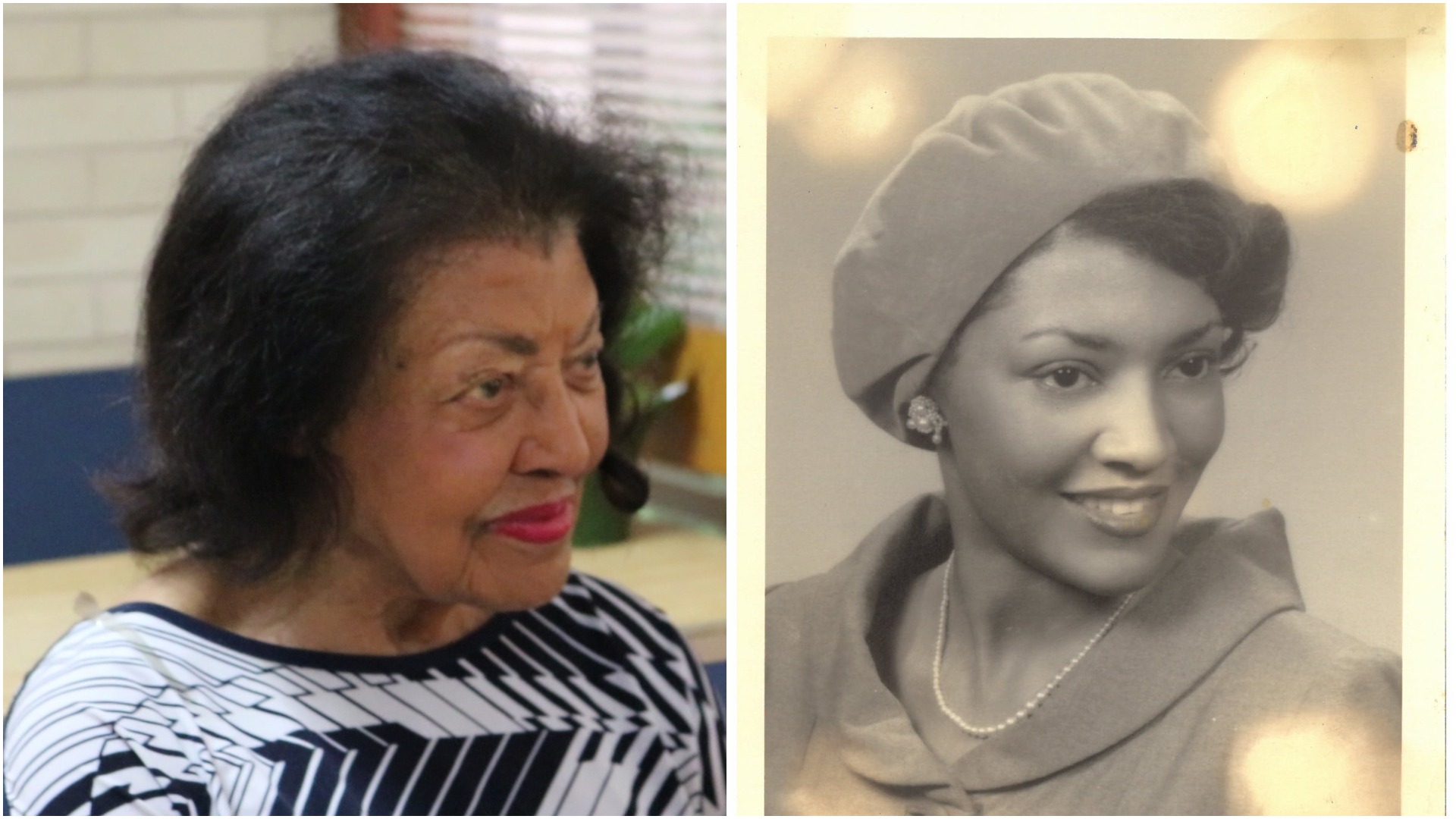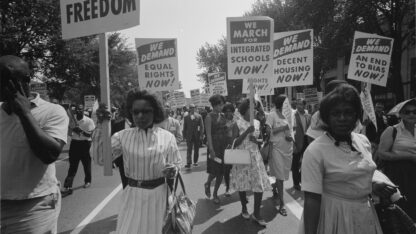100-year-old Spelman alumna broke boundaries as an accomplished fashion designer

Ann Jewel Moore, seen above recently and in the 1940s, has a love of fashion that goes back to her youngest years, as she explained in a recent interview with “Closer Look.”
Candace Wheeler, left, courtesy of Spelman College
This September, Spelman College held a celebration to honor the life and accomplishments of 100-year-old Ann Jewel Moore.
For more than 20 years, Moore created custom designs with her own fashion company, Ann Moore Couturier, and her work was featured in a 1953 issue of Vogue magazine.
However, Moore’s love of fashion goes back even further, as she explained in a recent interview with “Closer Look” senior producer, and fellow Spelman alumna, Candace Wheeler.
The early years
In 1922, Moore was just 3 years old when she and her family moved to Georgia from Daytona Beach, Florida.
During the late 1920s and 1930s, the U.S. faced the Great Depression and — like much of the nation — Moore and her family dealt with tough times.
“When the Great Depression was spiraling out, it was a struggle to survive,” Moore told Wheeler while sitting in the lobby of her senior facility. “There was a lot of camaraderie that came out of that because people banded together and used their combined resources to help one another.”
For a young girl from Georgia to who had never left the country before to decide that she’s going to travel internationally…that she would aspire to do things on such a grand scale is worthy of praise and acclaim.
Gail O’Neill, an Atlanta-based journalist, television host, style editor and model
Those early years were formative, and Moore remembered being impressed by the daughter of a family friend who showed off her sewing skills.
“Her parents decided to send her to a special school. And, in this school, one of the things she was taught [was] how to sew by hand and make doll clothes,” Moore said. “I saw all of these gorgeous doll clothes she had made by hand, and I wanted to learn to sew like that. And, that was my earliest inspiration to get into fashion.”
Moore’s grandmother was her first sewing teacher. She learned on an old-fashioned Singer sewing machine operated by foot pedals.
Years later, Moore carried those early lessons to Spelman College, where she majored in economics. Later, she attended fashion design school in New York and, eventually, Paris.

“That was very interesting when I first enrolled in the classroom with an instructor who could not speak English,” Moore recalled with a laugh. “But, he made his hands talk.”
The language barrier wasn’t the only difference Moore overcame. She also learned a new design technique called “draping garments.”
“I couldn’t understand: how in the world can you drape with paper? In America, I’ve been used to draping with muslin. I said, well, one thing about it, you can’t stretch paper on the bias. What are you going to do if you’re going to try to drape up something that is on the bias with a piece of paper? But they felt in France that was a waste – too expensive to have fabric like muslin,” Moore said.
After Paris, Moore returned to the United States and settled down in Detroit. There, she opened her own fashion design company, Ann Moore Couturier.
Moore’s business was across the street from Motown, where she created custom designs for her clients.
“My philosophy was each individual has a fashion persona, and I’m trying to find out what that is and help you enhance that — you’re going to come with some kind of fashion experience. Then, I’m going to listen to this and study you and see how much of that I seem to agree with or see in you,” Moore said. “Then, if I can make some recommendations or some improvements here and there so that this basic wardrobe is not something that’s going to have a time limit to it.”
A lasting legacy
One of Moore’s favorite designs was the UbiquiSix — a six-piece garment that could transition a woman from day to evening.
Today, this design hangs at the Atlanta History Center in Buckhead.
On a tour of the facility, Jessica Vanlanduyt, vice president of Guest Experiences at the Atlanta History Center, explained the versatility of the piece.
“It’s this kind of daytime-to-nighttime, and so, you’ve got these six pieces, and you can go from the office to out to dinner out to a party. And so, you’ve got this wonderful, beautiful jacket and little kind of neckpiece with it. There’s a skirt and pant option and this beautiful kind of brocade. And it’s all in this kind of deep green. And so, really, you just take all of the pieces with you, and you can kind of mix and match throughout the day.”
Moore did not only break boundaries with her designs. Her time in the fashion industry spanned 20 years when it was incredibly difficult to excel as a woman and a woman of color.
“The fact that she is living in a time where she leaves Atlanta because of the lack of opportunities here for a young, African American woman. She goes to Detroit, is incredibly successful. …The influence that she had, and the place that she’s occupying in Detroit with Motown being, I believe, right across the street,” Vanlanduyt said. “So this kind of cultural phenomenon that’s happening, and for her to kind of be involved in that and for us to see the collections we get to look at the idea and the fun of the 1960s and 70s and what she’s doing.”
Gail O’Neill, an Atlanta-based journalist, television host, style editor and model, agreed that Moore’s accomplishments were groundbreaking.
“Let’s not even talk about her doing that 50 years ago, for a woman to do that today would be an astounding feat,” O’Neill said. “…For a young girl from Georgia to who had never left the country before to decide that she’s going to travel internationally…that she would aspire to do things on such a grand scale is worthy of praise and acclaim.”
Be in control of your own fashion.
Ann Jewel Moore
Moore said the 100th birthday celebration at Spelman College affirmed her career choices.
“The birthday celebration seemed to, I feel, gave me more validation of who I am,” she said. “There have been times where I had thought I took the wrong career; maybe put so much time and all of my energy in that because I ran into so many blocks and obstacles.”
Although Moore is now retired, she still has opinions of her own when it comes to current trends.
“I disagree with these tights women wear in the streets — they belong in the gym that’s where they started, and that’s where they should stay,” Moore said. “To me, I say, are women that desperate? Nothing left for imagination? I wholeheartedly disagree with that fashion.”
Moore also said, however, when it comes to fashion, it’s OK to be unique.
“Well, I think that clothes should be more personalized and don’t become slave to what’s the trend or the fashion is if it’s not you,” Moore said. “Be in control of your own fashion.”
“Closer Look” producer Grace Walker contributed to this post.








